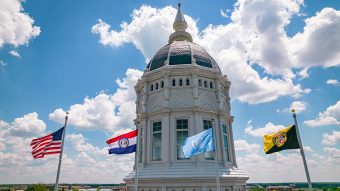
Life is logarithmic. A few small choices and lucky breaks early on can dramatically change the trajectory of one’s future. Susan Golden, who will receive an honorary degree from Mizzou May 16, traces hers to some glass flasks and a Bunsen burner.
Golden, PhD ’83, now a leading expert in bacterial genetics and circadian rhythm, was an undergraduate at the Mississippi University for Women in the 1970s when a chemistry class with an open lab sparked her interest in research. The lab instructor gave Golden and her classmates a list of experiments to perform and a tour of the lab space and then turned the students loose. “I loved being in the lab, not knowing what the outcome of the experiment was going to be,” Golden says.
She decided she wanted to go to graduate school and do research, so she sat down with a big guide to graduate programs, turned to the genetics section and looked for schools within a day’s drive of her Arkansas hometown. That process led her to apply to the genetics master’s program at Mizzou.
What happened next surprised her.
Free School and High Honors
Louis Sherman, a Mizzou professor of biological sciences, called Golden and asked if she’d like to pursue a National Institutes for Health-funded doctorate in biological science instead.
Sherman, now a professor at Purdue University, was recruiting doctoral students for a new NIH training grant in cell and molecular biology. He also happened to be on the admissions committee for the Mizzou genetics program, where he’d seen Golden’s application.
“I thought I’d died and gone to heaven,” Golden remembers. “Someone is offering to pay me to go to school?”
Golden had a bachelor’s degree in biology but no research experience. Neither of her parents had graduated from college. No one in her family worked in research. “Other than good grades, I wouldn’t have looked like a strong candidate for a doctoral program,” she says.
“For whatever reason, Mizzou took a chance on me and saw something there, saw potential.” - Susan Golden
Bacteria Breakthroughs
At Mizzou, Golden developed a genetic manipulation system for the bacterium Synechococcus elongatus to analyze the plant-type photosynthesis it performs.
In 1986, after researchers discovered circadian rhythms in that same group of bacteria, which goes through a generation in less than 24 hours, they asked to collaborate with Golden, who was then on the faculty at Texas A&M University, because she had the genetic techniques they needed to pry free the bacterium’s circadian secrets. Golden soon abandoned her research in photosynthesis.
“With circadian biology, there are so many things to discover. It’s so fresh and new,” the National Academy of Sciences member says after nearly 30 years of research. The implications of her work touch applied research from biofuels to chemotherapeutic drugs.
Taking Chances
Now a distinguished professor and director of the Center for Circadian Biology at the University of California San Diego, Golden relishes the opportunity to take chances on students she thinks are promising but have been overlooked by others. “Increasingly, I see that as my job,” she says. She considers the development of her students into independent thinkers and researchers as her proudest accomplishment.
During the Honors Convocation Saturday, when she stands on stage at the university that took a chance on her and developed her into the scientist she’s become, she’ll be focusing on just one thing: “I’m going to try hard not to sob,” she says.
Golden has received many prestigious awards. But an honorary degree from her alma mater carries a personal element that isn’t lost on her. “What it says to me is that people I respect and care deeply about think highly of me and are proud of my accomplishments,” she says, pausing to compose her emotions. “It’s very moving.”



